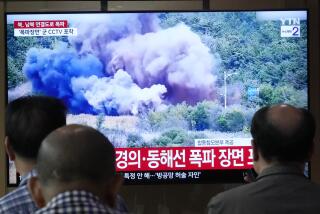N. Korea halts most border traffic
- Share via
SEOUL — Park Sung-chul knew the end was near when he saw the North Korean soldiers. Six uniformed men wanted to know how soon he could vacate his factory in the Kaesong industrial complex, a few miles north of the heavily fortified border with South Korea.
“I was a bit anxious,” the Seoul fashion entrepreneur said of the recent visit. “Because I knew it would be extremely difficult to reestablish economic cooperation between two Koreas.”
Today, Pyongyang made good on its threat to “restrict and cut off” traffic across its troubled border with the South, significantly reducing trade and ending all tourism in a move that further isolates North Korean leader Kim Jong Il’s mysterious and reclusive state.
A spokesman for the South Korean Ministry of Unification said today that northern officials had started to restrict border passage.
“North Korea will largely scale down the hours and number of South Koreans allowed to pass the border as expected,” he said.
Analysts called the border rift the most serious in years, highlighting the deteriorating relations between the two Koreas, whose recent economic overtures had rekindled hopes for reunification after decades of brinkmanship.
Tensions rose in February after the election of conservative South Korean President Lee Myung-bak, a hard-liner on Pyongyang, brought a review of the “sunshine policy” that had paved the way for billions of dollars in aid to the North without conditions.
Recently, North Korea bristled at public speculation in the South that Kim, 66, was weakened from a stroke. Seoul also continues to allow defectors to send political leaflets north via balloon, violating a pact prohibiting cross-border propaganda, North Korean officials say.
Analysts believe today’s move also was directed at the incoming administration of President-elect Barack Obama, sending a message that North Korea is not a nation to be taken lightly. Pyongyang recently announced that international inspectors monitoring its nuclear program could not remove samples from the country.
The border closure ended daily cargo rail service and tours to historic downtown Kaesong, with its royal tombs and ancient relics. It also dealt a blow to South Korea’s hopes to restart tours to a jointly run scenic resort in the North.
The tours to popular Mt. Kumgang were halted by Seoul in July when a South Korean tourist was killed by a North Korean soldier after she reportedly entered a restricted area. About 2 million people have visited the resort since tour operator Hyundai Asan Corp. began the excursions a decade ago.
But the Kaesong complex remained a crucial bargaining piece.
Analysts say the North seeks to humiliate its neighbor by closing the lucrative South Korean-run industrial park, which is widely viewed as a symbolic propaganda victory for the southern capitalists. Each day, thousands of Seoul entrepreneurs and workers cross the heavily guarded demilitarized zone to run dozens of factories.
But the closure comes at a painful price for the North. The factories employ 35,000 North Koreans, providing badly needed salaries in a nation whose 23 million citizens have faced continued deprivation and famine.
“I don’t think North Korea appreciates the damage they’re doing to themselves. The border closing comes off as arbitrary and capricious and chokes off business that otherwise could have been developed,” said Marcus Noland, a North Korea scholar at the Peterson Institute for International Economics in Washington.
“If you were an investor, would you put down real money in that sort of place?” he asked. “I have tried to explain to Pyongyang officials, when you do things like this, it’s not like everybody just forgets.”
North Korea had said that its army would “selectively expel” many southern factory operators, but it remained unclear how many would be allowed to return.
Seoul television reported today that Kaesong entrepreneurs and workers were being allowed to cross the border at only three specific times, compared with a dozen time slots in the past.
On Sunday, North Korean officials reiterated that all reading materials, specifically South Korean newspapers and magazines, were to be strictly prohibited.
On Friday, many Kaesong entrepreneurs crossed south over the border for what they feared would be the last time in a long while.
As he crossed, Tak Gi-Young, a Kaesong official, said he would miss his North Korean colleagues: “They are people I worked [with] for more than a year.”
Pyongyang accuses President Lee of pursuing a “confrontational” policy, alleging that the South has ignored agreements to assist them with shipbuilding, railway and road improvements.
Seoul has recently supported sponsors of a United Nations resolution criticizing the North for alleged human rights abuses.
North Korea has alternately referred to Lee as a “traitor,” “a pro-American sycophant” and “despicable human scum,” warning that it will reduce the South to “debris” if it continues Lee’s policies.
Kaesong entrepreneurs have appealed to Lee’s administration to seek a compromise with Pyongyang. They say the delicate cultural exchange will be sorely missed.
Although South Korean newspapers are banned in Kaesong, and all talk of politics is prohibited, North Korean workers have been exposed to the outside world in what one manager called “a silent exchange of ideas.”
As she crossed south over the demilitarized zone a few days before the border shutdown, South Korean tourist Oh Kyung-yeon was cautiously upbeat about the future.
Said the 53-year-old homemaker, “The [North Korean] guide said, ‘See you again after reunification.’ ”
--
Youkyung Lee in The Times’ Seoul Bureau contributed to this report
More to Read
Sign up for Essential California
The most important California stories and recommendations in your inbox every morning.
You may occasionally receive promotional content from the Los Angeles Times.











